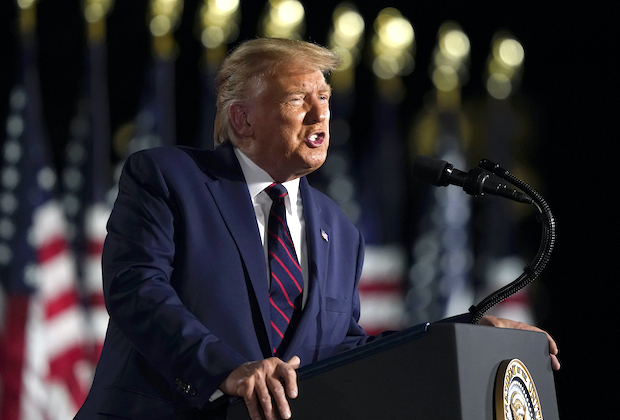After having watched on Friday the final debate featuring US President Donald Trump, and his Democrat challenger, Joe Biden, where both candidates expressed themselves on myriad issues—one was left speculating when such candidness would occur in the Indian electoral theatre. Trump and Biden, in their glaring contrasting styles, appealed to their respective constituencies, in an attempt to convince those who yet have to cast their vote. However, the widely anticipated confrontation had an underlining message, speaking volumes regarding the strength and resilience of democracy in the United States.
Most TV channels have projected Biden ahead of Trump in the race to the White House, but it is more than evident that the 2020 poll is going to be a referendum on the incumbent President. In fact, Trump is the undisputed central figure of this contest, and therefore, when ballots are cast, they will primarily be for or against him. In other words, Biden’s victory, in case it is so, would largely depend on the negative voting against the President.
Undoubtedly, Biden is a Washington Insider and commands considerable respect and support for his dignified behaviour and an overall inclusive approach. He is soft-spoken and presents his views effectively without being either loud or abrasive. On the other hand, Trump is an extremely assertive personality, and has during the campaign, focused more on his individual accomplishments rather than allowing his Republican Party to share the spotlight. In Friday’s debate, when most people expected Trump to break the rules, in order to assert himself, he kept his impulsive reactions in check, while putting across his opinions on subjects that are close to the American people. He accused his rival of benefitting financially from the positions he has held in the past, but adamantly refused to divulge the details of his own tax returns. The President is viewed as being buoyant on the revival of the economy while his handling of the Covid-19 pandemic remains to be under close scrutiny. Sections of the US media have described his continuously shifting stance on the dreaded disease, as his drawback, while maintaining that his refusal to wear a mask or follow scientific and medical advice, was indeed reckless, as it put the safety of others in severe jeopardy.
Biden, on the other hand, is considered as a person who has always adhered to the rules, being over-cautious on matters of propriety. According to the polls, he has been receiving substantial support from women in general, and was regarded largely as being honest, besides observing traditions without being divisive in his approach.
The lessons that need to be drawn in India from the “Debate” that dominated the news on 23 October, is that a similar event in future should be organized, during Parliamentary elections, featuring the principal candidates of both the ruling dispensation and the Opposition. The reason, for such a programme previously not being held was due to the fact that in the Westminster Model that we follow, the contest is largely amongst political parties, which ultimately, elect their leader, once the poll process culminates. However, in the past two polls, the approach to the Parliamentary elections has been on Presidential lines. The outcome is that Prime Minister Narendra Modi, like Donald Trump, in the US has been the central figure.
The result of the 2014 Lok Sabha elections propelled Modi to the national stage, but at that particular point, the vote was primarily against the Congress, which was reduced in the Lok Sabha to merely 44 seats. However, in 2019, the election was won by the BJP and its allies, solely due to the efforts of Modi and the wide support nationally endorsed to him. In plainspeak, it was a conclusive vote for the Prime Minister, elevating him as the unquestioned leader of the country.
Modi’s imprint on the elections is so amplified, that the contests in which the BJP is the prime player, his personality overrides the agenda. It is of little significance as to who is the party’s candidate, since people vote for or against Modi. This phenomenon is near-identical to the scenario in the United States, where the Republican victory or defeat hinges on how the electorate perceives Trump’s four years in office.
There has been extensive conjecturing on how Indian-Americans would be voting in the US Presidential polls. Conventionally, this strong segment has stood by the Democrats. Thus, it is to be seen, whether this trend would be replicated, since at the “Howdy, Modi” event last year in Houston, Modi had categorically endorsed Trump’s candidacy by declaring, “Abki Baar, Trump Sarkar”. Both Modi and Trump share a strong personal bond, and in many ways, have common traits which have assisted in making them the leaders of their respective countries. Nevertheless, this does not imply that in case Biden and Kamala Harris are elected, the equation between Washington and New Delhi would be affected adversely. Going by past experience, so far as foreign policy issues are concerned, the Republicans and the Democrats have a matching approach, based on the overall interests of their country.
China is a common factor that could possibly aid in forging stronger ties. The Chinese share in the spread of the pandemic is already a major matter in the ongoing Presidential elections. China’s activities on our borders have not gone unnoticed by the international community. Regardless of what happens on 3 November, the Indo-US equation can only be further strengthened. Between us.

